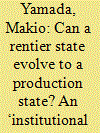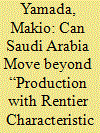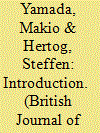| Srl | Item |
| 1 |
ID:
171899


|
|
|
|
|
| Summary/Abstract |
Can a rentier state evolve to a production state? This article attempts to answer this question by analysing how historically states evolved to production states and by comparing their experience with today’s Gulf states. Although the Gulf states show some productive traits today, their mode of production largely remains ‘production with rentier characteristics’, that is reliant on oil-driven advantages. Their further economic diversification requires improved governance capabilities that enable their government to enhance human capital. Production states around the world acquired such governance capabilities through ‘institutional upgrading’, a replacement of clientelistic institutions with meritocratic ones. While clientelistic institutions tend to persist, such institutions were significantly reduced in these states through the exit of vested-interest players from major fiscal and organizational spaces. The exit appears to occur when these vested-interest players accept pain-sharing to ensure their protection in the context of the revealed vulnerability of their patron regime and when alternative productive gains are offered to them in lieu of conventional distribution. Presently neither condition is in existence in the Gulf states, which continue to be characterized by their direct and extensive distributional regimes. Without a prospect for immediate governance improvement, a realistic reform possibility lies in agency under institutional constraints.
|
|
|
|
|
|
|
|
|
|
|
|
|
|
|
|
| 2 |
ID:
163605


|
|
|
|
|
| Summary/Abstract |
Saudi Arabia’s economic diversification to date has largely involved “production with rentier characteristics” — a mode of production that relies on oil-driven advantages such as energy- and capital-abundance and foreign labor. The kingdom’s previous attempts to invest in human capital development in order to create labor-intensive sectors for local citizens were hampered by institutional fragmentation in the education sector and the legacy of rentierism. While the current government is integrating the school system and training programs, capacity-building remains the major challenge in building a skilled Saudi workforce.
|
|
|
|
|
|
|
|
|
|
|
|
|
|
|
|
| 3 |
ID:
171897


|
|
|
|
|
| Summary/Abstract |
This special issue revisits the ideas of rentierism, or rentier state theory (RST), advanced in Hazem Beblawi and Giacomo Luciani’s edited volume The Rentier State (1987), with particular focus on countries in the Gulf and Arabian Peninsula.1 Rentierism/RST, a theory that posits negative effects of external income and its distribution on political liberalism and economic development, has been serving as the dominant intellectual frame of reference for studies of resource-dependent countries in the Gulf and wider Middle East and North Africa region over the past three decades, both for scholars elaborating on it and for those critical of it.
|
|
|
|
|
|
|
|
|
|
|
|
|
|
|
|